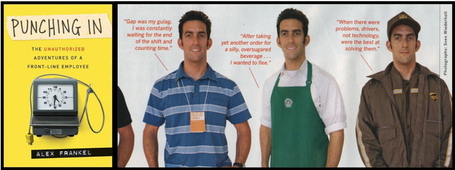
Alex Frankel is a curious marketer and writer—a dangerous, but fitting, combination. He became curious to “know whether the strong corporate cultures that companies bragged about were really as great as advertised.” But instead of quenching his curiosity by researching this topic from the outside-looking-in, Alex went the inside-looking-out route as a front-line employee to tell this story.
In order to tell this story from the front-line employee perspective, Alex went undercover as a UPS package-delivering employee, Enterprise Rent-a-Car insurance up-selling associate, clothes-folding Gap employee, Latte-slinging Starbucks Barista, and Apple platform-converting sales evangelist. You can read all about his brand adventures while in the trenches in PUNCHING IN: The Unauthorized Adventures of a Front-Line Employee.
We’re gonna take a three-part deep dive into Alex’s book and share insights on how the right corporate culture, expressed in the right ways, can take “anybodies” off the street and transform them into “somebodies” willingly obedient to live for the brand they work for.
Alex and I traded emails and the following is a snippet of our exchange.
johnmoore (jm): Alex, what surprised you the most about your time as an undercover front-line employee?
Alex Frankel (AF): I went in convinced that each of the jobs I would be doing would be soulless and the people I’d be working with would be somehow plastic, but I was wrong. Some of the corporations I worked for don’t get it when it comes to creating an appropriate and vibrant place to work, but by and large the people I met were not robotic at all. At every company I worked, there was always a person on staff that believed in out given enterprise and that was surprising to see.
jm: A theme that runs thick in your book is the importance of creating a corporate culture that employees can believe in. As a front-line employee, you write that you believed in the UPS corporate culture, but found the corporate culture at Starbucks inauthentic and forced. You described the Starbucks approach to instilling its corporate values as “heavy-handed culture-building.” Explain why you believed in UPS but were cynical about Starbucks.
AF: A lot of why I believed in UPS but not so much in Starbucks had to do with me, not the companies, but this is something I did not understand at the outset of the project.
Essentially, the best of the frontline corporate cultures match the people who are hired. I am someone much more hardwired to be a good fit at UPS than at Starbucks. This is largely because I am more at home in jobs where I have a bit more autonomy from hour to hour and I like to be active, as opposed to standing behind a counter.
I found my work rhythm faster at UPS than I did at Starbucks though I must admit that my colleagues at Starbucks who were masters at making drinks on the bar were definitely in the groove.
Also, I found the mode of culture building much more fluid and bottom-up at UPS. At Starbucks I immediately encountered many documents (such as one titled The Green Apron Book) that codified the culture in a top-down manner; at UPS I felt I was learning quickly about the culture from my fellow employees not "headquarters."
{Backstory note: The Green Apron Book (photo) that Frankel refers to is a pocket-sized booklet that has codified the Starbucks customer service culture. Inside the booklet, Starbucks shares five core values it wants front-line employees to embody: Be Welcoming; Be Genuine; Be Considerate; Be Knowledgeable; Be Involved. This booklet is relatively new to Starbucks, having been introduced only a few years ago. Learn more here, here, and here.}
jm: What would you say is needed most for a business to establish a great corporate culture?
AF: If you can attract customers to work for your company who arrive as fans of the company before they even start work, you are in good shape. The Apple Store is lucky enough to have a huge group of Apple fans from whom to choose its workers, as is The Container Store.
If you don’t have a fan base, the next best thing is to match a corporate culture as close as you can to the type of people who will end up working at your company or stores. Enterprise Rent-A-Car is filled with hard charging achiever types and training is catered to that group specifically.
jm: You have a lot of hot opinions about Enterprise Rent-A-Car in PUNCHING IN, especially as it relates to the training, or more appropriate, the indoctrination of new employees. What did you find most effective and most egregious about the Enterprise new employee orientation/training process?
AF: Enterprise was the one frontline workplace in which I worked where the new hires were sent away for a week of intense off-site training. (My group of 12 lived at a hotel and took classes by day.) This was really effective and a great way to teach us everything in a condensed, focused manner. We learned about the history of the company, the ways of operating, the corporate mission, and got a good dose of indoctrination into the culture.
At the same time, because of this intense weeklong orientation, I became a cynic pretty early on. We were told over and over that this was not just an hourly job, but a career path we were commencing. I knew that for some there would be great upward mobility, but that for most of the new folks the job would be not much greater than an hourly gig and a demanding one at that. (FYI, new hires are expected to work 60 or so hours each week, getting paid hourly and overtime, but not a salary.)
read PART TWO | read PART THREE